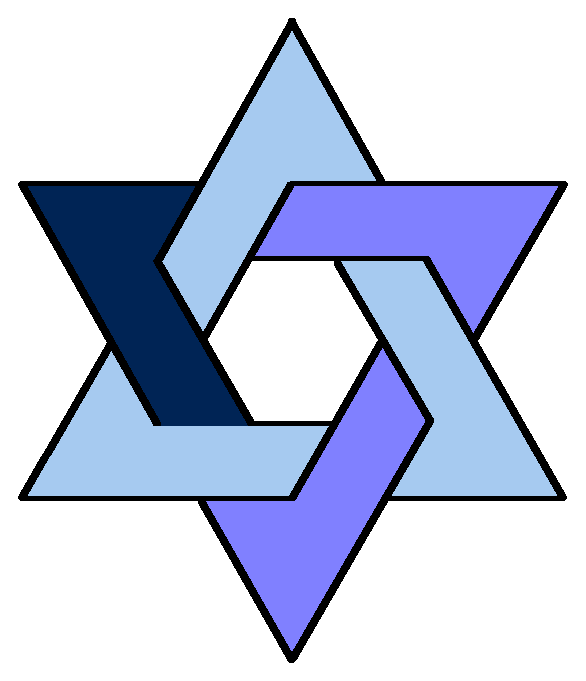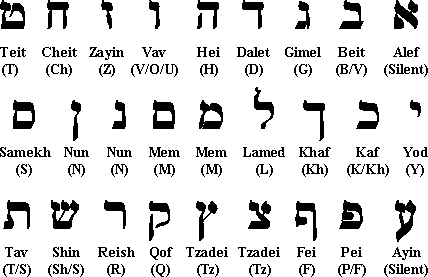Level: Basic
Please note: This page contains the Name of God. If you print it out, please treat it with appropriate respect.
In Jewish thought, a name is not merely an arbitrary designation, a random combination of sounds. The name conveys the nature and essence of the thing named. It represents the history and reputation of the being named.
This is not as strange or unfamiliar a concept as it may seem at first glance. In English, we often refer to a person's reputation as his "good name." When a company is sold, one thing that may be sold is the company's "good will," that is, the right to use the company's name. The Hebrew concept of a name is very similar to these ideas.
An example of this usage occurs in Ex. 3:13-22: Moses asks God what His "name" is. Moses is not asking "what should I call you;" rather, he is asking "who are you; what are you like; what have you done." That is clear from God's response. God replies that He is eternal, that He is the God of our ancestors, that He has seen our affliction and will redeem us from bondage.
Another example of this usage is the concepts of chillul Ha-Shem and kiddush Ha-Shem. An act that causes God or Judaism to come into disrespect or a commandment to be disobeyed is often referred to as "chillul Ha-Shem," profanation of The Name. Clearly, we are not talking about a harm done to a word; we are talking about harm to a reputation. Likewise, any deed that increases the respect accorded to God or Judaism is referred to as "kiddush Ha-Shem," sanctification of The Name.
Because a name represents the reputation of the thing named, a name should be treated with the same respect as the thing's reputation. For this reason, God's Names, in all of their forms, are treated with enormous respect and reverence in Judaism.
I have often heard people refer to the Judeo-Christian God as "the nameless God" to contrast our God with the ancient pagan gods. I always found this odd, because Judaism clearly recognizes the existence of a Name for God; in fact, we have many Names for God.
The most important of God's Names is the four-letter Name represented by the Hebrew letters Yod-Hei-Vav-Hei (YHVH). It is often referred to as the Ineffable Name, the Unutterable Name or the Distinctive Name. Linguistically, it is related to the Hebrew root Hei-Yod-Hei (to be), and reflects the fact that God's existence is eternal. In scripture, this Name is used when discussing God's relation with human beings, and when emphasizing his qualities of lovingkindness and mercy. It is frequently shortened to Yah (Yod-Hei), Yahu or Yeho (Yod-Hei-Vav), especially when used in combination with names or phrases, as in Yehoshua (Joshua, meaning "the Lord is my Salvation"), Eliyahu (Elijah, meaning "my God is the Lord"), and Halleluyah ("praise the Lord").
The first Name used for God in scripture is Elohim. In form, the word is a masculine plural of a word that looks feminine in the singular (Eloha). The same word (or, according to Rambam, a homonym of it) is used to refer to princes, judges, other gods, and other powerful beings. This Name is used in scripture when emphasizing God's might, His creative power, and His attributes of justice and rulership. Variations on this Name include El, Eloha, Elohai (my God) and Elohaynu (our God).
God is also known as El Shaddai. This Name is usually translated as "God Almighty," however, the derivation of the word "Shaddai" is not known. According to some views, it is derived from the root meaning "to heap benefits." According a Midrash, it means, "The One who said 'dai'" ("dai" meaning enough or sufficient) and comes from the fact that when God created the universe, it expanded until He said "DAI!" (perhaps the first recorded theory of an expanding universe?). The name Shaddai is the one written on the mezuzah scroll. Some note that Shaddai is an acronym of Shomer Daltot Yisrael, Guardian of the Doors of Israel.
Another significant Name of God is YHVH Tzva'ot. This Name is normally translated as "Lord of Hosts." The word "tzva'ot" means "hosts" in the sense of a military grouping or an organized array. The Name refers to God's leadership and sovereignty. Interestingly, this Name is rarely used in scripture. It never appears in the Torah (i.e., the first five books). It appears primarily in the prophetic books of Isaiah, Jeremiah, Haggai, Zechariah and Malachi, as well as many times in the Psalms.
Jews do not casually write any Name of God. This practice does not come from the commandment not to take the Lord's Name in vain, as many suppose. In Jewish thought, that commandment refers solely to oath-taking, and is a prohibition against swearing by God's Name falsely or frivolously (the word normally translated as "in vain" literally means "for falsehood").
Judaism does not prohibit writing the Name of God per se; it prohibits only erasing or defacing a Name of God. However, observant Jews avoid writing any Name of God casually because of the risk that the written Name might later be defaced, obliterated or destroyed accidentally or by one who does not know better.
The commandment not to erase or deface the name of God comes from Deut. 12:3. In that passage, the people are commanded that when they take over the promised land, they should destroy all things related to the idolatrous religions of that region, and should utterly destroy the names of the local deities. Immediately afterwards, we are commanded not to do the same to our God. From this, the rabbis inferred that we are commanded not to destroy any holy thing, and not to erase or deface a Name of God.
It is worth noting that this prohibition against erasing or defacing Names of God applies only to Names that are written in some kind of permanent form. Orthodox rabbis have held that writing on a computer is not a permanent form, thus it is not a violation to type God's Name into a computer and then backspace over it or cut and paste it, or copy and delete files with God's Name in them. However, once you print the document out, it becomes a permanent form. That is why observant Jews avoid writing a Name of God online: because there is a risk that someone else will print it out and deface it. See a 1998 discussion of the issue at The Sanctity of God's Name, Part 1: Erasing Sacred Texts from a Computer Screen if you're interested, but be aware that the lengthy article is thick with technical religious jargon, not always explained.
Normally, we avoid writing the Name by substituting letters or syllables, for example, writing "G-d" instead of "God" and "L-RD" instead of "Lord." In addition, the number 15, which would ordinarily be written in Hebrew as Yod-Hei (10-5), is normally written as Teit-Vav (9-6), because Yod-Hei is a Name (Yah). See Hebrew Alphabet for more information about using letters as numerals.
Nothing in the Torah prohibits a person from pronouncing the Name of God. Indeed, it is evident from scripture that God's Name was pronounced routinely. Many common Hebrew names contain "Yah" or "Yahu," part of God's four-letter Name. The Name was pronounced as part of daily services in the Temple.
The Mishnah confirms that there was no prohibition against pronouncing The Name in ancient times. In fact, the Mishnah recommends using God's Name as a routine greeting to a fellow Jew. Berakhot 9:5. However, by the time of the Talmud, it was the custom to use substitute Names for God. Some rabbis asserted that a person who pronounces YHVH according to its letters (instead of using a substitute) has no place in the World to Come, and should be put to death. Instead of pronouncing the four-letter Name, we usually substitute the Name "Adonai" (which means "my lord," a title that can be used for human lords) or simply say "Ha-Shem" (literally, The Name).
Although the prohibition on pronunciation applies only to the four-letter Name, Jews customarily do not pronounce any of God's many Names except in prayer or study. The usual practice is to substitute letters or syllables, so that Adonai becomes Adoshem or Ha-Shem; Elohaynu and Elohim become Elokaynu and Elokim; Eil becomes Keil, etc.
With the Temple destroyed and the prohibition on pronouncing The Name outside of the Temple, pronunciation of the Name fell into disuse. Scholars passed down knowledge of the correct pronunciation of YHVH for many generations, but eventually the correct pronunciation was lost, and we no longer know it with any certainty. We do not know what vowels were used, or even whether the Vav in the Name was a vowel or a consonant. See Hebrew Alphabet for more information about the difficulties in pronouncing Hebrew. Some religious scholars suggest that the Name was pronounced "Yahweh," but others do not find this pronunciation particularly persuasive. Historian Flavius Josephus, who was born a kohein at a time when the pronunciation of the Name was still known, said that the name was four vowels (War of the Jews, Book V, Chapter 5), probably referring to the fact that each of the four consonants in the name can serve in Hebrew as a vowel or vowel marker. See Hebrew Alphabet.
Some people render the four-letter Name as "Jehovah," but this pronunciation is particularly unlikely. The word "Jehovah" comes from the fact that ancient Jewish texts used to put the vowels of the Name "Adonai" (the usual substitute for YHVH) under the consonants of YHVH to remind people not to pronounce YHVH as written. A sixteenth century German Christian scribe, while transliterating the Bible into Latin for the Pope, wrote the Name out as it appeared in his texts, with the consonants of YHVH and the vowels of Adonai, and came up with the word JeHoVaH ("J" is pronounced "Y" in German), and the name stuck.

